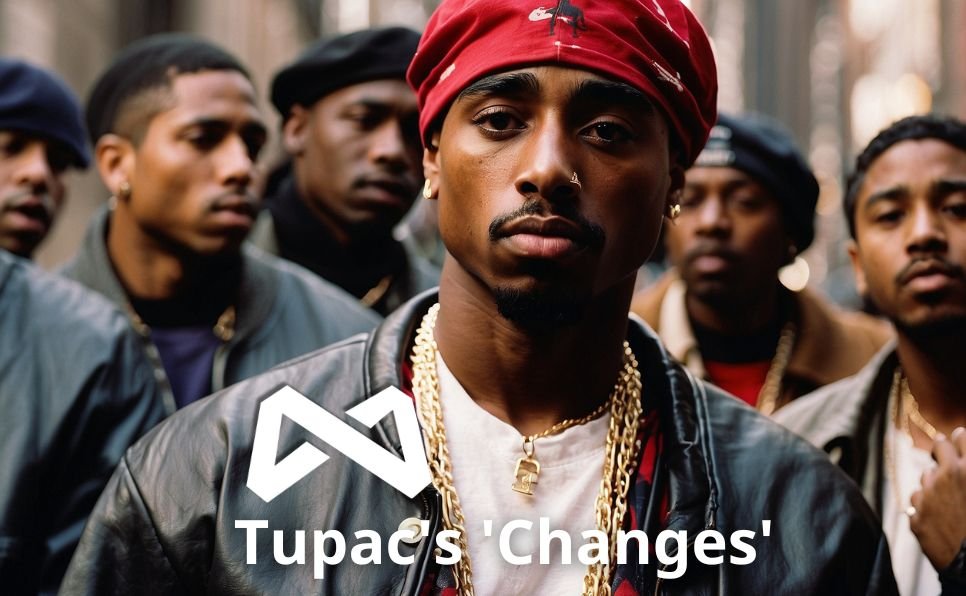In the world of hip-hop, few songs have achieved the cultural significance of Tupac Shakur’s “Changes.” Released posthumously in 1998, this track remains one of Tupac’s most celebrated works, a testament to his ability to capture societal struggles and individual perseverance in a few powerful verses.
But “Changes” is more than just a rap classic; it’s a profound commentary on systemic inequality, racial injustice, and the quest for a better future. In this blog, we delve deep into the lyrics of “Changes”, exploring its meaning, cultural impact, and why it still resonates today.
The Background of ‘Changes’
The Creation of a Classic
Tupac recorded “Changes” in 1992, years before its posthumous release on the album Greatest Hits. The track features a sample from Bruce Hornsby and the Range’s “The Way It Is”, a hit that also dealt with themes of societal disparity. By incorporating this familiar melody, Tupac created a bridge between generations and genres, ensuring the message reached a wider audience.
The rawness of the lyrics reflects Tupac’s state of mind in the early ’90s—a period marked by violence, racial tension, and personal struggles.
Breaking Down the Lyrics: Line by Line
1. “I see no changes, wake up in the morning and I ask myself, ‘Is life worth livin’? Should I blast myself?”
This opening line is a stark reflection of Tupac’s mental and emotional state. It reveals the hopelessness felt by many in impoverished communities, where systemic barriers and violence strip away opportunities.
By addressing the struggles of mental health, Tupac sets the tone for a song that doesn’t shy away from uncomfortable truths.
2. “Cops give a damn about a negro? Pull the trigger, kill a na, he’s a hero.”***
Here, Tupac directly confronts police brutality and the dehumanization of Black lives—a topic as relevant today as it was in the early 1990s. This lyric illustrates the systemic racism that perpetuates violence and neglect in marginalized communities.
Tupac’s boldness in addressing these issues elevated him as not just an artist but an activist willing to use his platform for change.
3. “We gotta start makin’ changes, learn to see me as a brother instead of two distant strangers.”
One of the song’s central themes is unity. Tupac challenges listeners to rise above racial and societal divides, promoting empathy and understanding as essential steps toward progress.
This line reflects Tupac’s belief in collective responsibility and the need for personal and societal transformation.
4. “It’s time to fight back, that’s what Huey said. Two shots in the dark, now Huey’s dead.”
Referencing Huey P. Newton, the co-founder of the Black Panther Party, Tupac ties his message to the legacy of Black activism. This lyric highlights the dangers faced by those who challenge oppressive systems while honoring the sacrifices made by past leaders.
5. “And still I see no changes, can’t a brother get a little peace?”
The repetition of “no changes” underscores the cyclical nature of systemic issues. Tupac’s frustration resonates with anyone who has witnessed promises of reform without real progress.
This recurring line serves as a powerful reminder of the urgency for action.
Themes in ‘Changes’: A Deeper Exploration
1. Racial Injustice
Tupac’s critique of racial discrimination is evident throughout the song. By addressing police brutality, economic disparity, and systemic oppression, he captures the lived experiences of many in the Black community.
The enduring relevance of these themes highlights Tupac’s foresight and the persistent challenges faced by marginalized groups.
2. Socioeconomic Struggles
“Changes” isn’t just about race—it’s also a commentary on class. Tupac’s references to poverty, crime, and limited opportunities highlight the interconnectedness of race and socioeconomic status in perpetuating inequality.
3. Personal Accountability and Unity
While Tupac critiques external systems, he also calls for introspection within the Black community. Lines like “We gotta make a change” emphasize the need for personal responsibility and collective action.
The Cultural Impact of ‘Changes’
A Global Anthem
“Changes” transcended the boundaries of hip-hop, becoming an anthem for social justice movements worldwide. Its inclusion in academic discussions, protests, and documentaries underscores its universal appeal.
A Voice for the Voiceless
Tupac’s ability to articulate the struggles of the disenfranchised earned him a place as a voice for the voiceless. “Changes” became a rallying cry for those demanding equality, proving the power of music as a tool for activism.
Inspiring Future Generations
Artists like Kendrick Lamar, J. Cole, and Childish Gambino have drawn inspiration from Tupac’s socially conscious lyrics. Tracks like “Alright” and “This is America” echo the themes of “Changes”, showing Tupac’s enduring influence on modern hip-hop.
Why ‘Changes’ Still Matters
Timeless Relevance
The issues Tupac addressed in “Changes”—police brutality, racism, poverty—remain pressing concerns today. The song’s message continues to resonate, making it a touchstone for activists and artists alike.
A Blueprint for Socially Conscious Rap
For emerging rappers, “Changes” serves as a blueprint for balancing artistry with activism. Tupac’s ability to merge hard-hitting truths with compelling beats demonstrates the potential of rap as a medium for change.
Conclusion: Tupac’s Vision for a Better World
“Changes” is more than just a song—it’s a manifesto for a better world, a reflection of Tupac’s unyielding belief in the power of change. By addressing systemic injustice while calling for unity and personal accountability, Tupac crafted a timeless anthem that continues to inspire and challenge listeners.
For newbies discovering Tupac’s work and seasoned rappers seeking inspiration, “Changes” is a masterclass in blending art with advocacy. As we decode its lyrics and themes, we’re reminded of the profound impact one voice can have in shaping the world.
Learn more about Lyrics Legend:


Tupac’s ‘Changes’ hits hard, man! A real anthem for the struggle, shining light on what’s dark!
From the block to the mic, he spoke truth to power! ‘Changes’ ain’t just a song; it’s a movement, hour by hour!
Yo, that line about cops? Still relevant today! Tupac kept it real, never scared to say what we gotta say!
This track is a blueprint for the real ones out there, calling for change, showing love, and breaking the despair!
‘We gotta make a change’—that hits deep! Tupac’s wisdom still inspires, keeping dreams alive when we sleep!
Sampling Bruce Hornsby? Genius move! Tupac bridged the gap, showing how music can groove